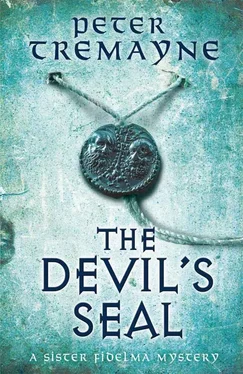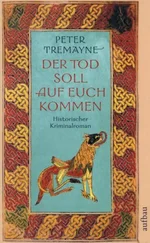Peter Tremayne - The Devil's seal
Здесь есть возможность читать онлайн «Peter Tremayne - The Devil's seal» весь текст электронной книги совершенно бесплатно (целиком полную версию без сокращений). В некоторых случаях можно слушать аудио, скачать через торрент в формате fb2 и присутствует краткое содержание. Год выпуска: 2014, ISBN: 2014, Издательство: Hachette UK, Жанр: Исторический детектив, на английском языке. Описание произведения, (предисловие) а так же отзывы посетителей доступны на портале библиотеки ЛибКат.
- Название:The Devil's seal
- Автор:
- Издательство:Hachette UK
- Жанр:
- Год:2014
- ISBN:9781472208330
- Рейтинг книги:3 / 5. Голосов: 1
-
Избранное:Добавить в избранное
- Отзывы:
-
Ваша оценка:
- 60
- 1
- 2
- 3
- 4
- 5
The Devil's seal: краткое содержание, описание и аннотация
Предлагаем к чтению аннотацию, описание, краткое содержание или предисловие (зависит от того, что написал сам автор книги «The Devil's seal»). Если вы не нашли необходимую информацию о книге — напишите в комментариях, мы постараемся отыскать её.
The Devil's seal — читать онлайн бесплатно полную книгу (весь текст) целиком
Ниже представлен текст книги, разбитый по страницам. Система сохранения места последней прочитанной страницы, позволяет с удобством читать онлайн бесплатно книгу «The Devil's seal», без необходимости каждый раз заново искать на чём Вы остановились. Поставьте закладку, и сможете в любой момент перейти на страницу, на которой закончили чтение.
Интервал:
Закладка:
The Venerable Verax leaned forward with a gasp. ‘I hear they were stolen from the thieves — but do you know for certain that they were destroyed?’
‘Having come thus far, let us finish.’ Fidelma ignored his question. ‘You landed in the Kingdom of Laighin. You told people there you were on a deputation to learn the views of the abbots and bishops. But you also asked questions of merchants and travellers to see whether your thieves had reached there. In fact, they had landed in a port further south but not in Laighin. It was a port in this Kingdom of Muman called Láirge. They had hired a river boat to take them here.’
Brehon Fíthel interrupted. ‘One of these thieves you say was someone who called himself Victricius?’
‘He called himself the Venerable Victricius of Palestrina, passing himself off as an elder of the religious,’ Fidelma confirmed. ‘He had already been caught stealing and was flogged in Canterbury.’
‘I am afraid that his companion was my own brother, Egric,’ Eadulf added stiffly. ‘My young brother, who by the strangest coincidence of fate survived the attack and was brought to Cashel. He tried to keep up the disguise that he was a religious, travelling with this Venerable Victricius on some religious mission. I felt he was lying but could not accept it.’
‘So Victricius and Egric were the thieves who stole the items from Canterbury and brought them to Port Láirge?’ Colgú concluded.
‘Indeed,’ Fidelma nodded. ‘Victricius and the boatmen were attacked and killed on the river. Egric survived. The items were initially thought to have been stolen or destroyed.’
Everyone was tense now, looking towards her. She turned and motioned to Eadulf, who produced something wrapped in a cloth, which they had brought into the council chamber.
‘Unfortunately, when the thieves arrived at the harbour of Láirge, they met the person who was to set in motion the events that led to all the deaths here. Until he makes a full confession, we can only surmise the details. He met Victricius and Egric at Láirge. He discovered what they had to trade. He saw the tremendous value of the items and knew that, with them, he could acquire rank and power. There was just one problem: he personally could not afford to purchase them.
‘So he told Victricius and Egric to take a boat up the River Siúr, to head for Cluain Meala, the Field of Honey, where they would be contacted. Of course, he had no intention of them ever reaching that township. He arranged with a small band of outlaws, led by Rudgal, to ambush them. They were to steal what they could, but ensure that certain items were taken and brought to him. As we know, Rudgal and his companions killed Victricius and the two boatmen, and also believed they had killed Egric.’
‘But you said some items were saved?’ the Venerable Verax pressed anxiously.
Fidelma gestured to Eadulf, who unwrapped the cloth he had before him. From it, he produced the embroidered lambswool band that Brother Conchobhar had found wrapped around the waist of Rudgal. The Venerable Verax rose and took the item from Eadulf, his eyes wide and hands trembling.
‘It is the pallium !’ he gasped. ‘The same pallium blessed by the Holy Father.’
‘Unfortunately,’ continued Fidelma, ‘Rudgal and his gang of cut-throats were not too mindful either of life or the value of the written word. Rudgal found and kept the pallium , but his companions simply ransacked and destroyed the papers, including the document given under the Bishop of Rome’s seal. Rudgal and his attackers took what items they deemed of immediate value and set fire to the rest.’
‘How can we be sure that the document with the Holy Father’s seal was destroyed?’ demanded Venerable Verax.
Eadulf reached into his robe and drew out the small lead fragment that looked like a coin.
‘It is lucky that when I was in Rome, I had seen similar items,’ he said. ‘Here is the lead seal with the letters V.I.T.A. inscribed on it and an emblem. When our warriors came across the scene of the attack by the river, one of them, Dego, spotted this lead token on the ground. It was among the burned papers. He picked it up, thinking it was merely a worthless coin, and decided he would use it as a weight for his fishing line. So this was the only other item that survived.’
He dropped it into the Venerable Verax’s outstretched hand. The man glanced at it and uttered a deep sigh. ‘It is indeed the Holy Father’s bullae — his seal — which is attached on all official documents from his hand.’
Brehon Fíthel asked to see the item, turning it over between his fingers. ‘Curious, indeed,’ he remarked. ‘I would have thought such an important seal would have been made of a metal of finer quality than mere lead. What do you call it? A bull?’
‘The word bullae means a seal,’ explained the Venerable Verax, taking it back from the Chief Brehon before glancing at Fidelma. ‘So this is all that has survived? No other documents?’
‘It is all,’ confirmed Fidelma.
‘Then it seems that our journey has been wasted.’ Bishop Arwald was clearly disappointed.
‘Wasted?’ rebuked Fidelma. ‘Is any journey wasted? I hope not. You have the pallium and you have the bullae . And perhaps you and your party may have learned something about our kingdoms.’ She looked the Venerable Verax straight in the eye and added, without a change of expression, ‘You may even inform people that Strabo was in error when he told the world that we were cannibals. Learning that fact, surely, was no waste of a journey!’
‘I mean that our fear of these items falling into the wrong hands was no fear at all,’ Bishop Arwald replied stiffly.
‘On the contrary,’ Fidelma returned, ‘there was a fear — and that fear has engendered the deaths of eight people! In addition, a young warrior is now disabled for life and, had Eadulf and I not been lucky, it might have meant our deaths or injury as well.’
‘Eight deaths?’ The Venerable Verax frowned.
‘Your thief and his companion, Egric, two innocent boatmen, Brother Cerdic, Rudgal, Sister Dianaimh, Beccan the steward. . I am not even counting the gang of outlaws led by Rudgal.’
‘Are you saying that all these deaths were caused by the same event — all came about through the robbery of these items in Canterbury?’ It was the Chief Brehon Fíthel who asked the question.
‘I do.’
‘ Post hoc, ergo propter hoc ,’ Bishop Arwald commented sarcastically. ‘As these events happened after the first event, so you claim that they must have been caused by that event. Well, it does not follow.’
‘On the contrary, I have already said that when the theft took place in Canterbury, the thieves came to this kingdom, and landed in Láirge’s harbour, where they met the person who was determined to get what they carried by any means. So their fate was sealed — and that action had a series of reactions.’
‘And who was this someone?’ asked Chief Brehon Fíthel. ‘Are you going to identify him?’
‘Of course. Some here already know his identity. However, let me lead you through the morass of deceptions, so you will understand the logic. After the attack by the Déisi outlaws, and the report of the incident to the Brehon at Cluan Meala, Cummasach, the Prince of the Déisi, set out to find the band of outlaws to track them down. They put up a fight and most of the band perished. There were three exceptions. Two men escaped — Maon and his companion, who are now dead. But their leader, Rudgal, was taken captive. He had been told the value of the cloth. He wrapped it around his waist and intended to bargain it for his freedom.
‘The conceiver of the murderous plot could not allow that. There was a crude attempt to make Rudgal’s death look like suicide, but what his killer did not realise was that Rudgal actually had the pallium wrapped around his waist. It was found when the body was prepared for burial and has been hidden in Brother Conchobhar’s apothecary ever since.’
Читать дальшеИнтервал:
Закладка:
Похожие книги на «The Devil's seal»
Представляем Вашему вниманию похожие книги на «The Devil's seal» списком для выбора. Мы отобрали схожую по названию и смыслу литературу в надежде предоставить читателям больше вариантов отыскать новые, интересные, ещё непрочитанные произведения.
Обсуждение, отзывы о книге «The Devil's seal» и просто собственные мнения читателей. Оставьте ваши комментарии, напишите, что Вы думаете о произведении, его смысле или главных героях. Укажите что конкретно понравилось, а что нет, и почему Вы так считаете.











